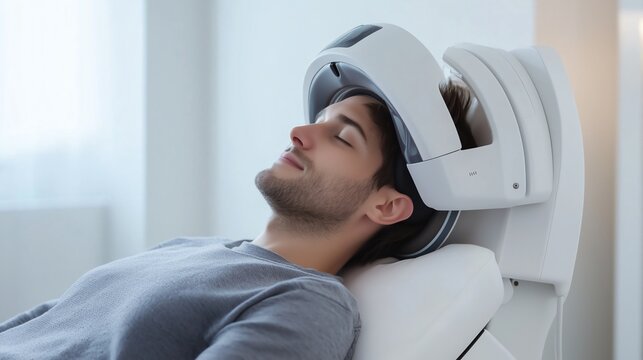- +91-6280506961
- chrysalis.mhc@gmail.com
- Chandigarh

At CHRYSALIS CLINIC, we offer rTMS (Repetitive Transcranial Magnetic Stimulation) as part of our advanced, non-invasive treatment options for mental health disorders and addiction recovery. rTMS is a cutting-edge therapy that uses magnetic fields to stimulate specific areas of the brain, offering a promising solution for individuals with treatment-resistant conditions like depression, anxiety, and other mood disorders.
rTMS is a non-invasive procedure that involves the application of repetitive magnetic pulses to targeted areas of the brain. These pulses stimulate the brain cells (neurons) and promote neuroplasticity—helping the brain form new connections and improving its function over time. rTMS is typically used to modulate areas of the brain involved in mood regulation, emotional processing, and cognitive functioning.
rTMS has shown significant promise in the treatment of mental health disorders and addiction, particularly when other therapies have been ineffective. Here’s how it can help:
Depression: rTMS is widely known for its effectiveness in treating major depressive disorder (MDD), especially in patients who have not responded to antidepressant medications. By targeting the prefrontal cortex, which plays a role in mood regulation, rTMS helps to alleviate symptoms of depression and improve overall emotional well-being.
Anxiety: rTMS can be used to treat anxiety disorders by modulating brain areas involved in fear processing and emotional regulation, leading to a reduction in anxiety symptoms and improved emotional resilience.
Addiction: For patients dealing with substance use disorders, rTMS can help by stimulating areas of the brain involved in reward, decision-making, and self-control, which can reduce cravings and enhance cognitive function. It can be particularly effective in treating alcohol, opioid, and nicotine addiction.
Post-Traumatic Stress Disorder (PTSD): rTMS helps to reduce symptoms of PTSD by improving brain function in areas involved in fear processing and emotional regulation.
Cognitive Impairments: rTMS has been shown to improve cognitive functions like memory, attention, and problem-solving, making it beneficial for individuals with cognitive disorders or those experiencing cognitive decline.
Non-invasive: rTMS is a non-surgical procedure, which means no anesthesia, no incisions, and minimal discomfort.
Minimal Side Effects: Most people experience very few side effects from rTMS, with the most common being mild headaches or scalp discomfort, which typically subside after a short time.
Targeted Treatment: rTMS allows for precise stimulation of the brain’s specific areas, making it a targeted treatment that is highly individualized to the patient’s needs.
Well-Tolerated: Unlike medications, which can have systemic side effects, rTMS primarily affects the brain area being targeted, making it well-tolerated by most patients.
At CHRYSALIS CLINIC, we take a personalized approach to rTMS treatment. Our expert team, led by Dr. Abhishek Gupta, carefully evaluates each patient’s condition to identify the most effective areas of the brain to target. The rTMS procedure is typically performed in an outpatient setting, with patients sitting comfortably while the treatment is administered. Sessions usually last between 20 to 40 minutes, and a typical treatment course may require multiple sessions over several weeks.
rTMS is a highly effective therapy for those seeking lasting relief from mental health issues and addiction, particularly when other treatments have not provided sufficient benefits.
Let us help you explore the transformative potential of rTMS in your recovery journey, guiding you toward lasting healing and well-being.